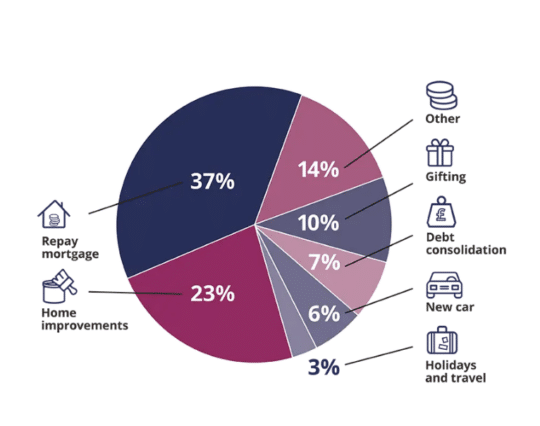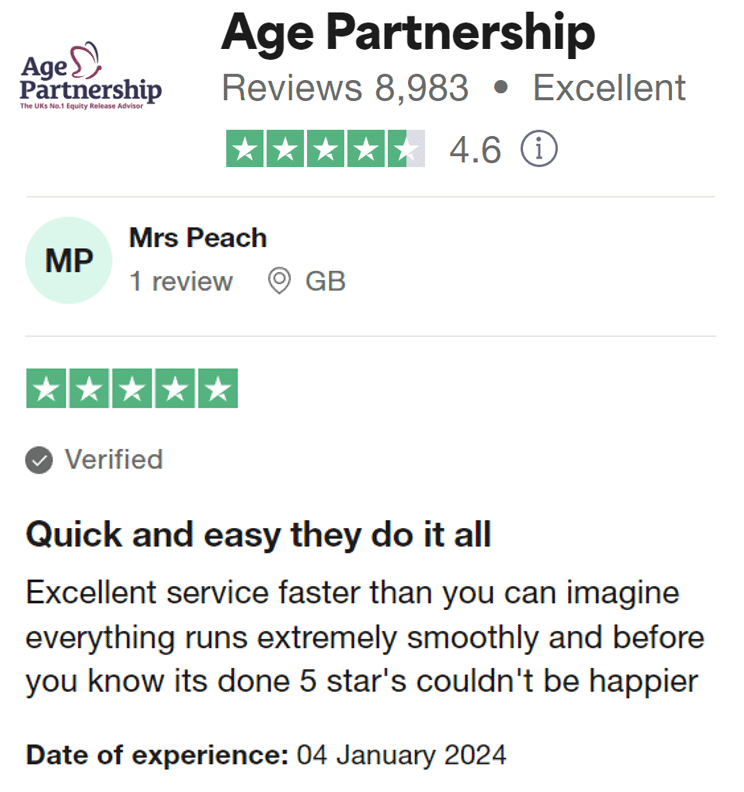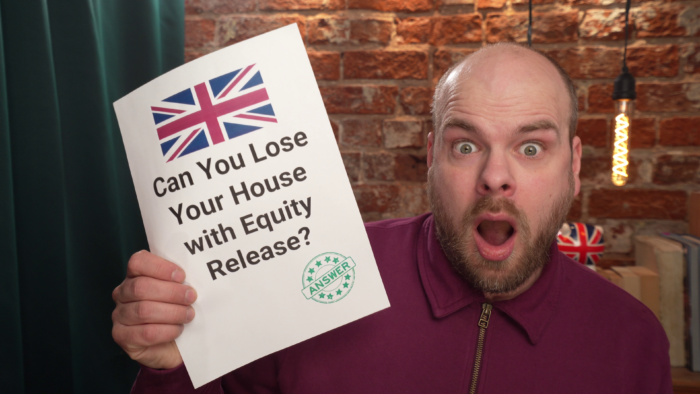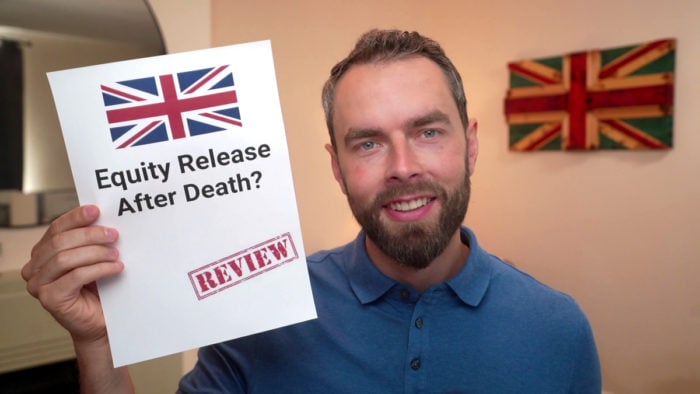Equity Release to Pay Off Mortgage – All You Need to Know
Our preferred equity release adviser is Age Partnership. For free and impartial money advice you can visit MoneyHelper.

Our preferred equity release adviser is Age Partnership. For free and impartial money advice you can visit MoneyHelper.
Are you asking if you can use equity release to repay your mortgage? If so, you’ve come to the right place. At MoneyNerd, we help over 7,000 people every month to understand equity release better. In this article, we’ll cover:
- What home equity is and how you calculate it.
- How to get an honest quote for equity release.
- The risks when you put your home’s equity in danger.
- The amount of equity you can take from your home.
- Whether releasing equity from your home is a good idea.
We know that the process of equity release can seem tricky. You might be worried about losing your home or not having enough money for your needs. But don’t worry; we’re here to help you. We understand your concerns and will guide you through each step.
Let’s get started.
What is home equity and how do you calculate home equity?
Home equity refers to the amount of value you own outright in your home. You can calculate how much equity you have by subtracting your outstanding mortgage balance away from the value of your property. You will also need to subtract any other debts you may have against your home if applicable.
For example, if the value of your property is £220,000 and you have £100,000 left to pay on your mortgage, then you would have £120,000 home equity (220,000 – 100,000). The equity on your home can also be referred to as a percentage. So if you have £120,000 equity when the value of your home is £220,000, you have 54% home equity.
Make sure you use an updated value of your home!
A word for warning when making a home equity calculator – always use the most up to date value of your home. Many homeowners use the value of their property when they bought it to do this calculation. But this could lead to errors in the amount of home equity you have because property valuations can change quickly.
You don’t need to pay for a property appraisal, but you could look at what similar properties nearby are selling for.
How do you pull equity out of your house?
To release equity from your home you must use your property as security within a loan. There are many types of loans that can allow you to release equity from your home. Some of these loans are available to most homeowners, while some might be only available to people of a certain age.
The most popular methods to borrow against your home equity are:
- Second charge mortgages (home equity loans and HELOCs)
- Remortgaging your current mortgage for a larger mortgage
- Equity release (lifetime mortgage or home reversion plan)
How much equity can I release from my house?
When you secure a debt against your property, you are agreeing that the lender can repossess and sell your home if you fail to repay the debt. To ensure the lender can get the money back and any interest and fees, they must make sure they only allow you to borrow against some of your home equity.
This will ensure all the debts secured against your home are likely to be repaid in full if the property does need to be repossessed and sold. And it also protects the lender in case your property declines in value and you cannot repay what is owed because the debt is greater than the property value (i.e. negative equity).
As a result, lenders will only allow you to borrow a lump sum of up to 80% of your home equity in a best-case scenario. This is known as the Loan to Value (LTV) ratio. Some methods of releasing equity only allow homeowners to borrow up to 60% equity in the best-case scenario.
Along with the method used, many other factors will affect how much equity you can release from your home. This includes your finances, age, credit score and even details about your home.
How equity release could help
More than 2 million people have used Age Partnership to release equity since 2004.
How your money is up to you, but here’s what their customers do…
Find out how much equity you could release by clicking the button below.
In partnership with Age Partnership.
Releasing equity with a second charge mortgage
A second charge mortgage is a term used to describe a loan that acts as a second secured loan on a property with an existing residential mortgage. Whereas the residential mortgage is paid back to buy the property over time, the second charge mortgage is simply a separate loan with separate monthly repayments secured by the property.
The two most popular second charge mortgages are home equity loans and home equity lines of credit (HELOCs).
Home equity loan vs HELOC
Home equity loans and HELOCs allow the homeowner to borrow against up to 80% of their equity in the best scenario. So if you had £120,000 equity on your £220,000 property, you might be able to get a loan worth up to £96,000.
With a home equity loan, this money is paid out as a lump sum and charged with fixed interest. Repayments carry on every month until the amount is repaid in full. But with a HELOC, the money is accessed over time as a drawdown, and a variable rate is charged.
- Can I remortgage my house to release equity?
Instead of securing a new debt against your home, you may prefer to extend your current residential mortgage to access some additional money. This is called remortgaging to release equity.
» TAKE ACTION NOW: Find out how much equity you could release
How does remortgaging to release equity work (Example!)
Remortgaging is when a homeowner switches their current mortgage deal for a new one. This is done to secure a new deal with a lower interest rate and save some money. When you remortgage to release equity, you are switching to a larger mortgage. Most of the money will be used to pay off the previous mortgage, and the rest of the money is given to you as a lump sum to be used as needed.
As a simplified example, if you own a £200,000 home with a £50,000 mortgage left to pay, you might decide to get a new mortgage for £70,000. You were allowed to borrow the additional £20,000 because you have £150,000 home equity available (200,000 – 50,000). You’ll use the first £50,000 to pay back the original mortgage lender and the further £20,000 can be used as needed.
Keep in mind early repayment charges
When you remortgage to release equity you need to keep in mind that paying off your first mortgage earlier than planned could incur early repayment charges, and these can be costly.
- Using equity release to access your home equity
Equity release is a way for people over 55 to access some of their equity as a lump sum or drawdown, typically to help fund their retirement. They can release money from their main residence without making any equity release repayments each month.
They only repay their equity release loan after they die or move into long-term care, at which point their property is sold to raise money and repay all of the equity release debt. The total debt owed at this point can be more than double the original loan amount, making it a difficult decision for those with children relying on an inheritance.
There are two types of equity release loans in the UK and these are called a lifetime mortgage or a home reversion scheme.
Lifetime mortgage vs home reversion plan
Lifetime mortgages apply interest to the loan and this interest is added to the initial loan amount. Every month the total debt grows and only becomes payable after the last surviving homeowner dies or moves into care.
The other form of equity release, a home reversion plan, exchanges the initial loan for a fixed percentage of the property’s future sale value. So you could access a lump sum of 25% equity today but it could cost you 50%, 60%, 70%+ of your property’s future sale value after you die or go into care.
What can you use equity release for?
Equity release can be used without restrictions, so you can spend it on anything you prefer. Most people use these loans as a way to fund their retirement. This may simply mean a pool of money they can rely on to help them improve their quality of life in later life. It could be used for frequent holidays, home renovations, private healthcare or further investments among many other possibilities.
How much does equity release cost?
To use an equity release plan you must access financial advice first and possibly require the help of a lawyer. The average cost to set up your equity release plan can be expensive and usually starts around the £2,000 mark for all services and fees required.
Is equity release tax-free?
The lump-sum you get from an equity release loan is not subject to any tax. But if you give the money away, these financial gifts can be subject to inheritance tax in some situations.
Join thousands of others who release equity
Age Partnership have helped over 2 million people release equity from their home.

Mrs Wareham
“I am more than pleased to have taken out Equity Release with Age Partnership.”
Reviews shown are for Age Partnership. Search powered by Age Partnership.
Ways to release equity from your home
Below we discuss three of the most common methods of releasing equity from a property in the UK. If you are a senior homeowner who has been rejected credit elsewhere, make sure to read about equity release in method number three.
Only consider any of the credit options below from a lender or bank that is authorised and regulated by the Financial Conduct Authority.
How can I release equity from my home? (quick recap!)
The way to release equity from your home is to borrow money against your property. Lenders will generally allow homeowners to borrow money based on how much home equity they have built up.
There are various methods of releasing equity from a UK home, including the popular options of using a second charge mortgage, remortgaging to release equity or using an equity release plan like a lifetime mortgage for seniors.
Things to consider
Equity release will involve a home reversion or a lifetime mortgage, which is secured against your property and will reduce the value of your estate and impact funding long-term care. Our equity release partner, Age Partnership provides a personalised illustration to explain the full details. The money you release, plus the accrued interest is then repaid when you die or move into long-term care. Advice is required before proceeding with equity release and any existing mortgage must be repaid. Age Partnership provide initial advice for free and without obligation. Only if your case completes would Age Partnership’s advice fee of £1,895 be payable. Other lender and solicitor fees may apply.




